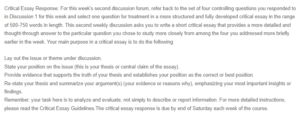Critiquing Consequentialist and Non-Consequentialist Ethics
The Concept of Ethical Egoism and how it differs from Psychological Egoism.
Ethical egoism is the belief that people can be self-serving while remaining moral. Ayn Randy’s view of ethical egoism is based on the trichotomy of three factors. These include those from the inside of the mind (subjective), outside the mind (intrinsic), and the phenomena resulting from the interaction between the two factors. Ethical egoism affirms that having a sense of purpose (self-interest) is moral (Rosenstand, 2020). For instance, if an individual decides to work as a social worker, their actions are moral to the extent that they fulfill specific self-interests. Although ethical egoism sounds like a good pursuit for an individual, it fails to serve the community’s interests. Get in touch with us at eminencepapers.com. We offer assignment help with high professionalism.
At the community level, ethical egoism is associated with a few weaknesses. For instance, it fails to provide a basis for solving conflicts. Conflict resolution mostly arises from compromise, which means that all parties involved should be willing to give up some of their own interests and reach a middle ground. However, ethical egoism makes people selfish, such that they only take care of their interests. Also, ethical egoism tends to promote intolerance in a community of people (García et al., 2023). That is because an ethical egoist will prevent others from doing anything as long as it does not align with their thinking. Besides, an egoist may be unwilling to advise others because that works against their interest.
Ethical egoism offers a twisted version of Glucagon’s principle of “doing unto others what we expect them to do unto others.” Whereas Glucagon’s principle seeks to ensure that justice is served, the reasoning behind an ethical egoist is twisted because it makes individuals focus only on self-interests instead of achieving justice for all (Rosenstand, 2020). Since ethical egoism does not promote collective welfare, it is not welcome.
In summary, ethical egoism makes individuals so subjective to their needs that they become selfish. Although serving self-interest is a good thing, people also need to pay attention to the needs of the rest of the community members. Besides, ethical egoism reverses the benefits of justice since an ethical egoist is disinterested in others’ welfare. Ethical egoists avoid messing with other people’s lives not because they want to be good people but because they fear that others may reciprocate.
References
García-Rosell, J. C., Moisander, J., & Mäkinen, J. (2023). Conceptual Framework for Understanding the Ethical Dimension of Corporate Social Responsibility. From Product to Purpose: Art, Fashion and Wine. Lexington Books.
Rosenstand, N. (2020). The moral of the story: an introduction to ethics. Mcgraw-Hill Education.
ORDER A PLAGIARISM-FREE PAPER HERE
We’ll write everything from scratch
Question 

Critiquing Consequentialist and Non-Consequentialist Ethics
Critical Essay Response: For this week’s second discussion forum, refer back to the set of four controlling questions you responded to in Discussion 1 for this week and select one question for treatment in a more structured and fully developed critical essay in the range of 500-750 words in length. This second weekly discussion asks you to write a short critical essay that provides a more detailed and thought-through answer to the particular question you chose to study more closely from among the four you addressed more briefly earlier in the week. Your main purpose in a critical essay is to do the following:
Lay out the issue or theme under discussion.
State your position on the issue (this is your thesis or central claim of the essay).
Provide evidence that supports the truth of your thesis and establishes your position as the correct or best position.
Re-state your thesis and summarize your argument(s) (your evidence or reasons why), emphasizing your most important insights or findings.
Remember, your task here is to analyze and evaluate, not simply to describe or report information. For more detailed instructions, please read the Critical Essay Guidelines.The critical essay response is due by end of Saturday each week of the course.